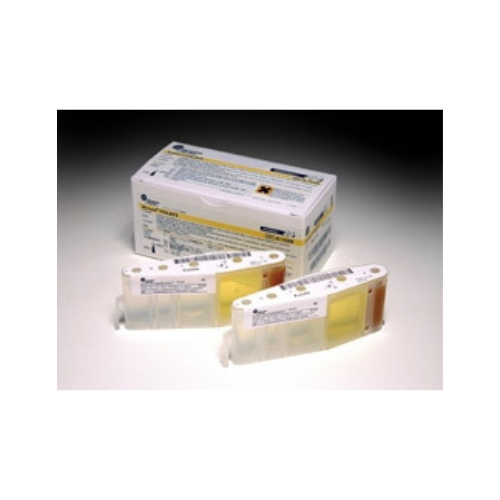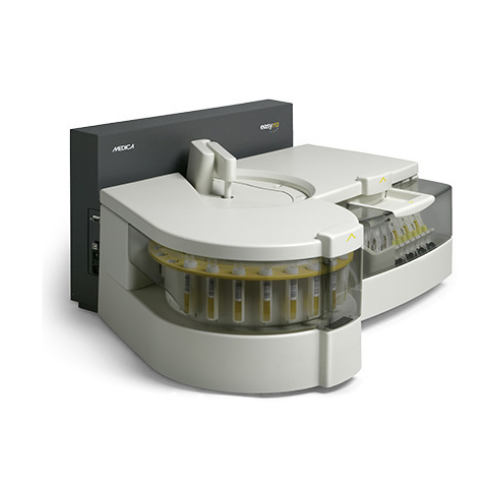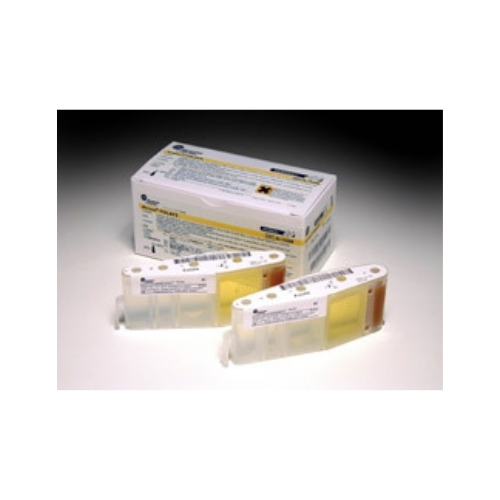For Business Use Only. Does Not Ship to Residential Addresses. For use inside an Analyzer, Sold Separately.
Beckman Coulter Access Hybritech PSA, 100 Determinations, 2 x 50 Tests
Product Code: 37200
Manufacturer: Beckman Coulter
Shipping Weight: 10.00lbs (4.54kg)
Specifications
Brand: Access® Hybritech®
Manufacturer: Beckman Coulter
Country of Origin: United States
Application: Reagent Kit
For Use With: For Access 2, Unicel DXI, Synchron LXI Systems
Number of Tests: 2 X 50 Tests
Sample Type: Serum Sample
Storage Requirements: Requires Refrigeration
Test Method: Chemiluminescent Immunoassay
Test Name: Prostate-specific Antigen (PsA)
Test Type: Cancer
Intended Use
The Access Hybritech PSA assay is a paramagnetic particle, chemiluminescent immunoassay for the quantitative determination of total prostate specific antigen (PSA) levels in human serum using the Access Immunoassay Systems. This device is indicated for the measurement of serum PSA in conjunction with digital rectal examination (DRE) as an aid in the detection of prostate cancer in men aged 50 years or older. Prostate biopsy is required for the diagnosis of cancer. This device is further indicated for the serial measurement of PSA to aid in the prognosis and management of patients with prostate cancer.
Summary and Explanation
Prostate cancer is the most common type of cancer found in men in the United States, with an incidence of approximately one case for every ten men. It is also the second leading cause of cancer deaths among American men. A reliable test for detecting early stage prostate cancer, when the tumor is confined to the gland and effective treatment can be provided, can be of great value to the physician. Historically, a majority of prostate cancers had advanced beyond the gland at the time of diagnosis. The digital rectal examination (DRE) is a commonly used technique for prostate cancer detection; nevertheless DRE, as it is generally performed in medical practice, misses a significant number of cancers, including many organ-confined tumors.
A multicenter, prospective clinical study of 6,374 men has provided additional information about the use of Hybritech PSA and DRE in the identification of men with prostate cancer. A summary of the results of this study follows in the “Expected Values” section.
Other clinical applications have been clearly demonstrated for PSA. When employed for the management of prostate cancer patients, serial measurement of PSA is useful in detecting residual tumor and recurrent cancer after radical prostatectomy. Moreover, PSA may serve as an accurate marker for monitoring advancing clinical stage in untreated patients, as well as assessing response to therapy. Therefore, serial measurement of PSA concentrations can be an important tool in monitoring patients with prostate cancer and in determining the potential and actual effectiveness of surgery or other therapies. Other biochemical markers such as prostatic acid phosphatase (PAP) and carcinoembryonic antigen (CEA) lack sufficient specificity for monitoring disease, and are unsuited for detecting early stage prostate cancer.
Prostate specific antigen (PSA) was identified and purified by Wang and co-workers in 1979. PSA is a single chain glycoprotein with a molecular weight of approximately 34,000 daltons, containing 7% carbohydrate by weight. PSA exists primarily as three forms in serum. One form of PSA is believed to be enveloped by the protease inhibitor, alpha-2 macroglobulin and has been shown to lack immunoreactivity. A second form is complexed to another protease inhibitor, alpha-1 antichymotrypsin (ACT). The third form of PSA is not complexed to a protease inhibitor, and is termed free PSA. The latter two forms are immunologically detectable in commercially available PSA assays and are referred to collectively as total PSA. The relative concentrations of the two detectable forms within and between patient samples is variable and unknown. However, it has been reported that the concentration of free PSA usually ranges from 5 to 50% of the total PSA in serum.











